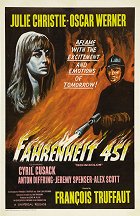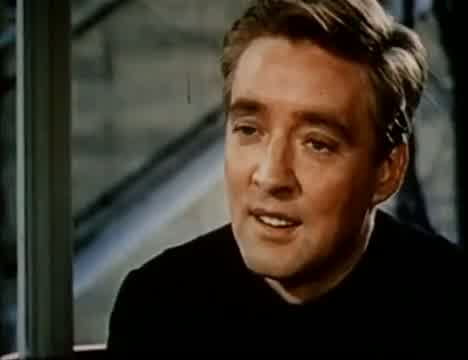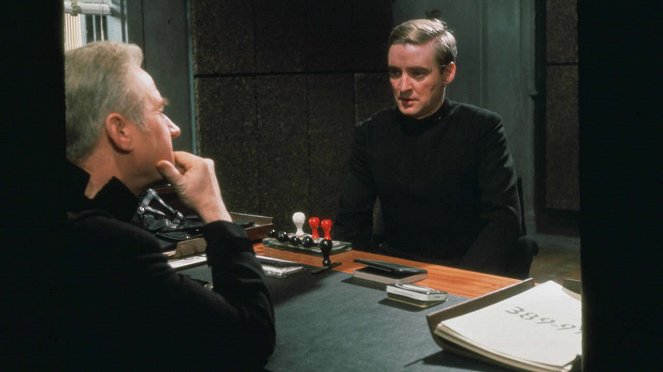Directed by:
François TruffautCinematography:
Nicolas RoegComposer:
Bernard HerrmannCast:
Oskar Werner, Julie Christie, Cyril Cusack, Anton Diffring, Ann Bell, Mark Lester, Eric Mason, Denis Gilmore, Michael Balfour, David Glover, Yvonne Blake (more)Plots(1)
Franncois Truffaut's only English-language film, his stark and gripping adaptation of Ray Bradbury's famed novel stars Oskar Werner as a book-burning "fireman" in a future society where all books and reading materials are banned. Julie Christie plays a dual role as Werner's wife and a bibliophile who opens his mind to the forbidden world of literature. (official distributor synopsis)
(more)Videos (1)
Reviews (8)
This was the fourth movie by François Truffaut that I watched and I was hoping it might surprise me a lot. The premise literally suggested it. But while watching, I quite quickly realized that it s more or less all about the premise. After all, the reviewer Enšpígl is right. The movie is quite emotionless. You can’t form a relationship with the characters. And that’s pretty bad, because in a world full of fascists I would need someone to hang onto and hope for the better. I didn’t see anything like that in the 112 minutes of this movie. I just glimpsed into a world that was making me sick. It was just as impersonal as the movie 1984, which introduced a similar premise.
()
The problem is that everything that is good, even excellent, in this movie is taken from the book. I'm having a hard time getting past the 60's American naivety and the expressively earnest acting. Even harder when I know that in two years Kubrick will make 2001 and Leone will make Once Upon a Time in the West. The joke with Ray Bradbury and Pride and Prejudice was a delight. On one thing, however, the film is absolutely right: "Aristotle's Ethics! Anyone who reads it starts to think he's better than someone who hasn't read it" -)
()
What happens when we start to hate books and ban them? Well, most likely we will realize that without culture, without art, we cannot exist, that art is what shapes us, what makes us think and what is capable of making us live. Not just us, but the whole society. A great message conveyed in a meaningful way. Bradbury didn't have to be ashamed of this delivery.
()
Fahrenheit 451 is nothing more or less than a dignified adaptation of Ray Bradbury's famous novel. I remember that, for example, Mel Gibson toyed with the idea of a remake repeatedly, and he certainly was not alone. You can sprinkle in a few million dollars, and add a series of special effects, but without a fundamental revision of the original text, there is nothing to be done with this work. I have no problem with Truffaut; in fact, I would say that his traditionally cooler and detached film style fits the story perfectly. However, I do have an issue with the literary source. I find Bradbury's depiction of totalitarianism unconvincing and the rebellion against the system naive. Bradbury created his work at a time when television gained a dominant position in the field of information distribution, and light television entertainment quickly overwhelmed the naively conceived idea of "elevating" the masses through television broadcasts of operas and educational documentaries. Bradbury seemed to think that higher culture would succumb to the battle against superficial pop culture, and the demise of culture would lead to the establishment of a totalitarian system. However, this allegory has several flaws. Books are not a stronghold of higher culture; they are merely a medium that can have various content and quality, just like a film or a television program. Except for the insane experiment of the Khmer Rouge, who took away much more from the people and essentially everything, no one ever thought of destroying books. Instead, they usually succeeded in taming books, often with great success. Bradbury would be shocked by the millions of copies of prominent authors' works and propagandistic writings in many dictatorships. The survival and success of a regime are not so much related to the size of libraries and cultural subsidies, but rather to the (in)ability to satisfy and entertain the population through consumption. The dictatorships in Eastern Europe certainly did not fall because Vaclav Havel's plays were not allowed or Marta Kubišová could not sing; they fell because the population hungry for consumption exchanged them for full shops following the example of Western Europe. The authoritarian system in China successfully survives even with censorship simply because China's economy is booming, and the extremely anti-cultural and intolerant religious system in Saudi Arabia, well-fed by oil, speaks for itself. Truffaut cannot be denied a good hand in choosing the main characters (perhaps I imagined the wife to be more insipid), the impressiveness of some scenes (the internal struggle of the informer), and above all, the atmosphere (the red fire truck ominously racing through the streets). Nevertheless, in the world of cinema today, I can find much more interesting and chilling dystopias. Overall impression: 60%.
()
What I’ve always liked the most about dystopia is the helpless and hopeless situation of the characters who try to stand up to the system. Those ingredients are present, so satisfaction. My only problem is that I can’t fully understand why this society would protect their power this way and through these means, and the tactics of the resistance (the book people) are questionable to say the least.
()



Ads